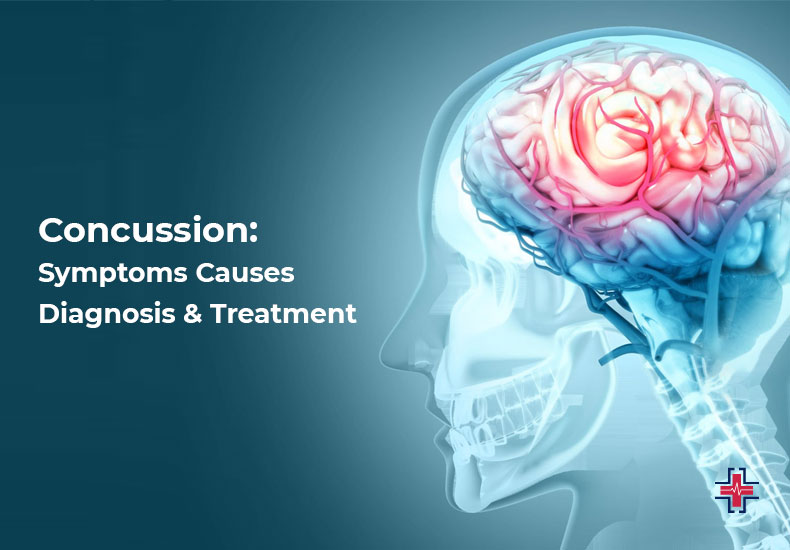A mild traumatic brain injury (TBI) that can happen following a head injury is called a concussion. A whiplash-type injury, which forces your head and brain to rock violently back and forth, can also result in concussions.
Not every head injury results in a traumatic brain injury. However, symptoms from concussions can be obvious and should not be disregarded. Headaches, altered mental states, and even unconsciousness are among them.
Although concussions often do not pose a substantial risk to life, they can result in severe symptoms that need to be treated by a doctor. Pain medication, rest, and a break from particular activities are possible forms of treatment.
Anybody can sustain a head injury, whether it’s from an automobile accident or a tumble at home. You have a higher chance of suffering a concussion if you play impact sports like football or boxing.
We’ll discuss the primary signs and symptoms of a concussion, how they change with age, how to treat them, and more.
What Is a Concussion?
A concussion is a minor traumatic brain injury that impairs normal brain function when it is caused by a bump, strong jolt, or blow to the head. A blow to the body that is powerful enough to cause your head to violently move backward, forward, or to the side might potentially result in a concussion.
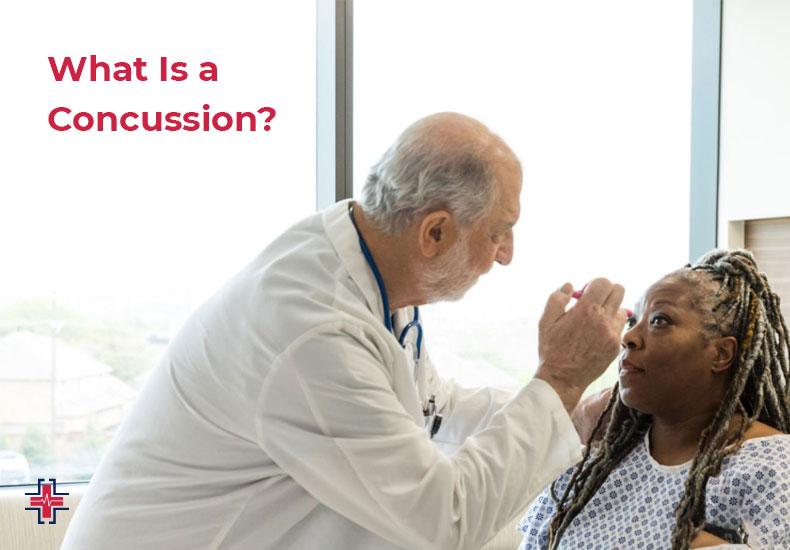
A concussion can produce chemical changes in the brain that lead to a temporary loss of normal brain function in addition to stretching and bruising blood vessels and nerves. Typically, a single concussion does not result in long-term brain damage. Your brain may have structural alterations as a result of multiple concussions during your lifetime.
Most concussions do not pose a serious risk to life. Concussions, however, can have dangerous side effects that linger for days, weeks, or even longer.
Concussions Are Serious
Usually, concussions do not cause life-threatening injuries, so they are described as “mild” brain injuries. However, concussions can still have serious consequences.
What Are The Symptoms of a Concussion?
The person who was hurt and the extent of the injury both affect the concussion’s symptoms. It’s untrue that a concussion usually results in unconsciousness. While some people do lose consciousness, others do not.
Although they can hurt, most concussions do not pose a serious risk to life. Despite this, you should always see a doctor if you believe you may have suffered a brain injury.
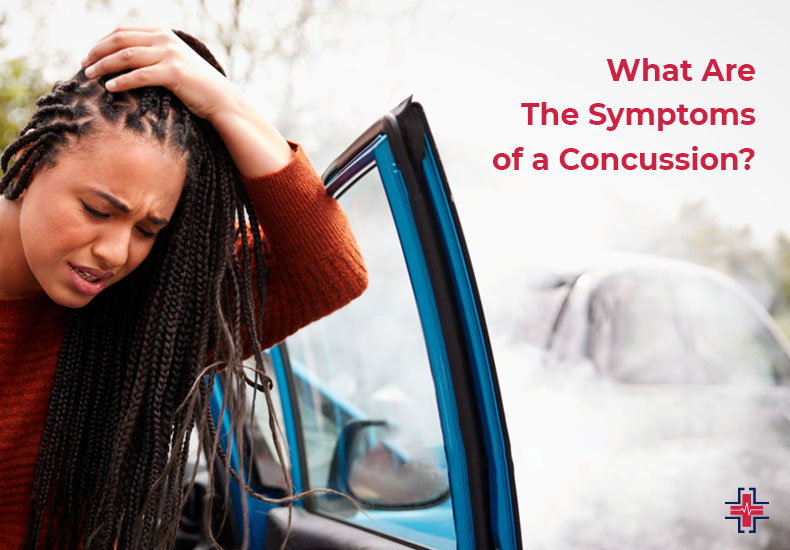
Symptoms of Concussion in a Loved One
There are situations when someone who has had a concussion cannot see the symptoms as well as others.
Other people’s observations of concussion symptoms include:
- Abrupt shifts in conduct, attitude, or personality
- Memory issues
- Sluggish reactions and reflexes
- A confused expression
- Losing awareness
After the damage, these symptoms may appear right away or they may take hours or days to manifest. To track any changes in symptoms, it’s critical to regularly check on someone who could have had a concussion.
Symptoms of Concussion in Yourself
Understanding how to identify a concussion in both oneself and another person is crucial.
The following are some symptoms that you might encounter during a concussion:
- Headache
- Feeling queasy or throwing up
- Balance issues
- Uncertainty or a sense of being lost
- Sensitivity to noise or light
- Sluggishness or sleepiness
- Blurry or double-vision
- Lightheadedness
Symptoms of Concussion in Babies
Babies do not have slurred speech, walking difficulties, or other distinctive symptoms that can be noticed in adults and children with concussions. However, concussion symptoms can differ in babies and may not be as evident at first.
Among the typical indicators of a concussion in infants are:
- A noticeable bruise or lump on the infant’s head
- Cries if you move the infant’s neck or head
- Seizures
- Vomiting
- Dilated eyes
- Anger
- Fatigue
Rarely, concussions in babies can result in irreversible brain damage. Even though most infants who suffer concussions recover, it’s still vital to have them examined by a physician. If your infant is unconscious, get medical attention right away.
Symptoms of Concussion After Recovery
You can continue to feel uncomfortable during the concussion recovery time.
Among them are:
- Anger
- Sensitivity to noise or light
- Having trouble focusing
- Slight headaches
Get medical help if you think you or someone else has suffered a brain injury.
What Causes a Concussion?
Brain tissue is pliable and flexible. Cerebrospinal fluid, which surrounds it, serves as a cushion between it and the hard, protective skull surface. When your brain undergoes a sudden, whiplash-like back-and-forth movement that causes it to contact with the interior of your skull, it can bounce or twist inside your skull. This is known as a concussion. This movement of the brain causes chemical alterations in the brain as well as stretching and injury to brain cells.
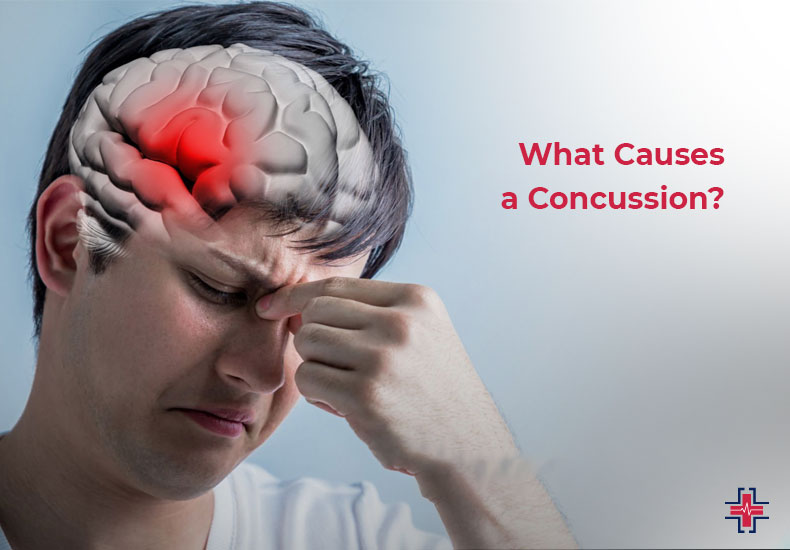
These injuries produce the telltale signs and symptoms of a concussion by briefly impairing normal brain activity. Concussions are frequently caused by sports injuries, motor vehicle accidents, and falls. Any contact sport has the potential to cause concussions.
The majority of childhood concussions occur on playgrounds, during bicycling, or in sports like soccer, ice hockey, football, basketball, or wrestling.
How is a Concussion Diagnosed?
Your doctor will inquire about the nature of the injury and the symptoms you are experiencing whether an appointment at the emergency room or doctor’s office is required. Additionally, you could be asked to rate the severity of your symptoms using a chart or questionnaire.
During the physical examination, your doctor could test your vision and balance. Using vision tests, medical professionals search for changes in pupil size, eye movements, and light sensitivity—all of which can result from concussions.
If there is a significant impact or symptoms, your doctor might ask for a brain MRI or CT scan to look for any damage.
If you have seizures after a concussion, your physician might also order an electroencephalogram (EEG), which tracks brain waves.
How Can I Assess My Athlete’s Brain for School or Sports Readiness?
Student-athletes can be assessed for their ability to return to school and sport after completing a hands-on neurological exam.
Hospital or Organization Concussion App
A few hospital systems’ sports health centers have created their own concussion applications. These mobile, tablet-based apps are used to report and evaluate symptoms associated with concussions.
The app can be used to record the athlete’s account of their injury, monitor symptoms over time, identify cognitive and memory impairment, and assist the athlete in returning to physical exercise to resume their sport after baseline data have been gathered. The software contrasts the athlete’s baseline and normative data with measures of balance, response speed, coordination, information processing, memory, and vision following an injury. Over time, treatment and therapies can be guided by the app-based assessment, which might highlight the areas of greatest concern.
ImPACT Neuropsychological Test
Student-athletes can be diagnosed and evaluated with the use of the ImPACT (instant post-concussion assessment and cognition test), a concussion management tool. This computerized exam gauges a student athlete’s processing speed, verbal and visual recall, and response time.
The 30-minute test is best conducted as a baseline test before the start of the sports season and at different times following a head injury. Care providers (medical, educational, or sports groups) can document brain function and determine whether it has returned to a student athlete’s healthy normal by evaluating test findings and comparing them with the baseline test. When it’s safe for a student-athlete to resume their activities, it can help with treatment decisions.
What Are the Treatments for Concussions?
Rest, both mentally and physically, is necessary for concussion recovery. You won’t need to sleep any more than usual, but you will need more rest than usual. Excessive mental rest prolongs the healing process and increases sensitivity to activities when you return to them, according to a study.
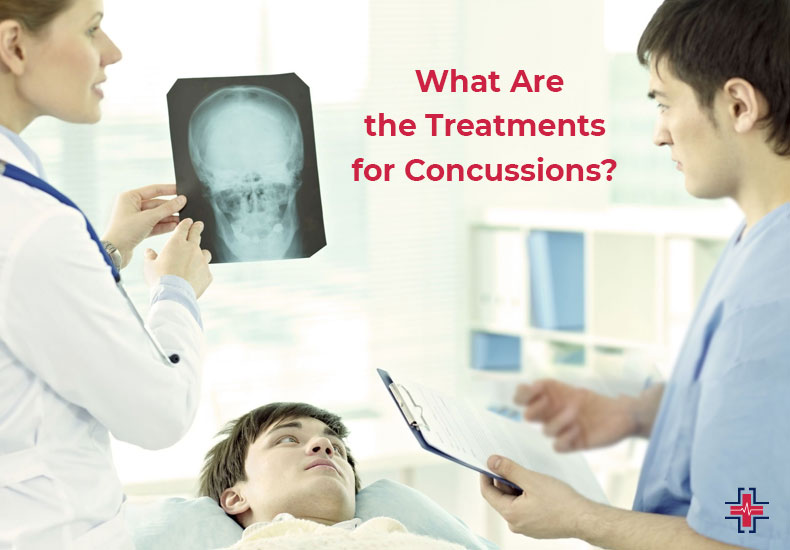
Recognize the causes that cause concussion symptoms and learn how to avoid them rather than completely halting activities. Restart gradually and with modest doses. When symptoms appear, take a break and relax. Participating in certain activities that don’t worsen your condition is OK. Limit the things you do that make your symptoms worse.
For instance, the following activities could exacerbate symptoms:
- Texting or consuming time with your smartphone’s screen open.
- Perusing.
- Observing TV.
- Engaging in video game play.
- Playing loud music.
- Engaging in any kind of physical exercise.
You can gradually resume more of your daily activities as your symptoms become better.
6 Stages of Concussion Recovery
Concussions are difficult since no medication can help you get back to how your body was before the accident. The only advice doctors will give you is to relax, refrain from exerting yourself, and give your brain and nervous system time to heal from the injury.
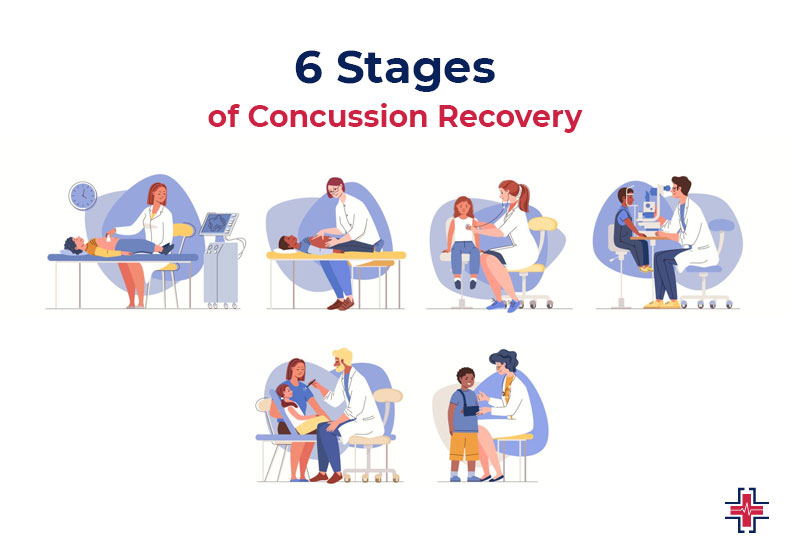
It can take a while to heal from a traumatic brain injury. Each patient may experience a different recovery time. Some people recover from concussions in less than a year, while others need years.
In light of this, individuals who have had a concussion usually go through the following six stages:
Acute Injury
Following a concussion, doctors refer to the first 24 to 72 hours as the acute phase. They will highly suggest taking it easy and reducing your activity. This includes skipping housework and requesting a sick day at work or school. Additionally, patients should abstain from alcohol use and should not take any medications—including painkillers—without a doctor’s approval.
Hours after the incident, people with small concussions may begin to feel better. Some may even recover sufficiently to resume their usual activities. However, individuals have to take things gently and wait at least three days before engaging in physically demanding activities like lifting large objects, participating in sports, exercising, or performing manual labor.
Physical Rest
Despite the common assumption, resting after a concussion won’t worsen the injury. Sleep is essential for the brain’s healing process. It is detrimental to a person’s recovery to shake awake someone who appears to have had a concussion every hour. Unless there is a compelling need to do otherwise—for example, the patient has to be alert for additional treatment—doctors will advise rest and sleep.
Having said that, during the first 48 hours, patients should always be accompanied by someone who can help them watch for symptoms and notify the doctors if things get worse quickly.
Period of Observation After Concussions
It will be difficult for patients who lead active lives or who are accustomed to working to do nothing during the resting phase. They will eventually feel as though everything is back to normal, and they will be able to resume their physical activities, travel, drive around and run errands, go back to work, and so on. Although that is encouraging news, they should still see their doctor and get the all-clear.
Why is a follow-up examination required? since the symptoms may not show up for several days or weeks following the occurrence. Additionally, there’s a chance of getting post-concussion syndrome. Months after the injury, symptoms continuing to exist is a warning sign for that. The patient will see their doctors more frequently after receiving a diagnosis of post-concussion syndrome because they will try their utmost to treat the symptoms.
More Physical Rest
The fact that there is no one solution for post-concussion syndrome is the most difficult aspect of experiencing it. While the symptoms that patients experience may be identical, there are differences in their length, intensity, and response to treatment. It will therefore be annoying, but doctors will probably advise even more rest. More than anything, they want to avoid any situation that could make the patient’s symptoms worse.
For the majority of patients, this is a challenging time because post-concussion syndrome might alter one’s way of life. It may also have an impact on your professional life as it will keep you from participating in physically demanding activities. It may also make it harder for you to concentrate and make decisions. Having a network of caring relatives and friends who can help with housework, meal preparation, shopping, running errands, and providing financial support when needed is essential during this time.
Therapy and Rehabilitation
Treatment and rehabilitation for brain injuries are the best ways to manage the symptoms of concussion over the long term. While the brain needs to relax to heal, patients also need to engage in cognitive exercises to recuperate. According to studies, playing word games and puzzles after a concussion causes an increase in heart rate variability, which indicates that the parasympathetic nervous system (PNS) is engaged.
A concussion can have the unintended consequence of activating an individual’s sympathetic nervous system (SNS), which triggers the “fight or flight” reaction, to an extreme degree. Both PNS and SNS function well together and activate at different periods of the day based on the situation (e.g., SNS is active during stressful work moments or rush hour driving, whilst PNS is active during downtime). A concussion throws off their timing. Furthermore, a lot of patients appear to have hyperactive SNS following their trauma.
The PNS will activate when doing cognitive tasks, activating the brain regions involved in critical thinking and decision-making.
How much time does it take to begin physical therapy? According to some researchers, patients can start 48 hours following their injuries. Walking is a good place to start, and you should gradually increase the duration or intensity of the activity until the patient can execute it without feeling any symptoms. It’s imperative to cease the exercise if you get any of the following symptoms: strong nausea, dizziness, or a headache that develops quickly. Before increasing again, the patient needs to take a step back and give themselves more time.
Getting Back to Norma Gradually
Regaining life before the injury is the last phase of healing. Even years after a traumatic brain injury, the brain can heal itself, but recovery may not come easily for some. Recovery and preventing a significant decline in the patient’s quality of life will depend on an accurate diagnosis and comprehensive therapy.
Does Diet Play Any Role in Recovery From a Concussion?
The scientific literature on concussions and nutrition currently needs to be more detailed. There is some information on diet school heads and the well-being of the aging brain. Supplements in diet that have been the subject of greater research include resveratrol, turmeric, fish oils, and green tea extract. Supplements should only be taken in combination with a diet low in processed foods and saturated fat and high in fruits and vegetables.
A person who has had a concussion might not feel as hungry or thirsty as they used to. Encourage people to eat frequently throughout the day to maintain blood sugar levels, and make an effort to consume six 8-ounce glasses of fluid (such as juice, water, or Gatorade®) each day. Low blood sugar and dehydration can mimic or exacerbate concussion symptoms, such as headache, dizziness, fogginess, stomachache, and irritability because the brain is susceptible to these situations.
How Long Does It Take a Person to Recover From a Concussion?
Every person experiences concussions differently, and this also affects how long it takes them to recover. However, most concussion symptoms go away in 14 to 21 days on average. However, a concussion that goes undetected, unrecognized, or receives inadequate treatment can cause a delay in recovery, extending it beyond the usual two weeks to months or even longer.
Consult a medical practitioner with expertise in managing concussions if you have been diagnosed with one and your symptoms have not improved or are still evident after 14 days.
Can Painkillers Be Used to Treat Concussion-Related Headaches?
Soon after a suspected concussion, avoid using aspirin and nonsteroidal anti-inflammatory medicines (NSAIDS), such as ibuprofen (Advil, Motrin) and naproxen (Aleve). These drugs thin the blood and hide symptoms, which raises the possibility of bleeding. Given that older persons frequently already take these medications, this is especially concerning for them if they fall and hit their heads. Acetaminophen (Tylenol) is a safer option for pain medication once a concussion is detected. The symptoms require careful observation.
What’s a Typical Recovery Plan For Students Who Have Experienced a Concussion?
It’s critical to understand that each person requires a customized recovery approach. This personalized plan can be created with help from your family physician or concussion specialist, and it can be given to the student to share with the school.
For symptoms to subside, students may first need to skip several days of class. The student should gradually introduce some mental activities, such as reading or journaling after they can manage their symptoms in a controlled setting at home. They can attempt to go back to school if they can engage in mental activity for an hour at home without experiencing worsening symptoms.
Half-day returns to school are not appropriate for students. Instead, students ought to make an effort to finish as many lessons each day as their concussion symptoms permit. For this, you might need to sleep longer each day. Instead of setting an alarm, students should wake up when their bodies and minds are prepared and, if their symptoms are school head. If a kid experiences symptoms while at school, they should go to a prearranged spot to rest, like the counselor’s or nurse’s office, before going back to class. The student should think about returning home if their symptoms cause them to spend more time in the area meant for rest and recovery than in class.
FAQs
Can You Sleep With a Concussion?
Experts in medicine now concur that staying awake after a concussion is not required. Nonetheless, it’s critical to wake a concussed individual every few hours to make sure their symptoms aren’t getting worse. A concussion won’t result in death or a coma by itself.
Even though moderate head injuries might cause a variety of symptoms, doctors now advise resting and sleeping as long as the patient can converse. You have no trouble walking. You don’t have dilated pupils.
What is 1 Minute Concussion Test?
Should the competitor receive a blow to the head, they must go to the sidelines and retake the exam. An athlete may have suffered a concussion if they finish the test five seconds slower than they did the first time. The 1-minute concussion test and the 2-minute concussion test are other names for this examination.
Can a Concussion Cause a Fever?
Yes, fever can result from head injuries. Because the fever has a neurological foundation rather than an infectious etiology, it is known as neurogenic fever. Neurogenic fever is reported to affect 4–37% of TBI survivors, according to research.
Is Vomiting Dangerous After a Head Injury?
Post-traumatic vomiting occurred in 7% of adults and 12% of children overall. In individuals with cranial fractures, post-traumatic vomiting occurred in 28% of adult patients and 33% of pediatric patients. There was a four-fold increase in the relative risk of a skull fracture following post-traumatic vomiting.
Conclusion
The least dangerous kind of brain injury is a concussion. A concussion can result from any type of impact or shock to the head, including falls and sports-related injuries. There may be an emergency and you should see a doctor at the Urgent Care Mesquite straight away if you experience any of the following symptoms: vomiting frequently, losing consciousness for longer than 30 seconds, or a headache that is getting worse. Recuperating from a concussion is best achieved by resting and gradually returning to your regular activities.
